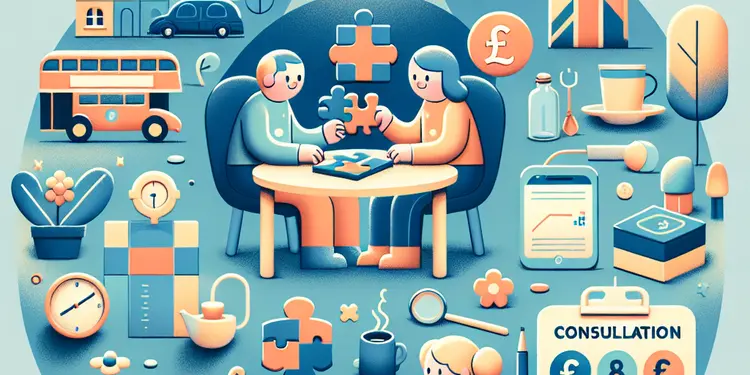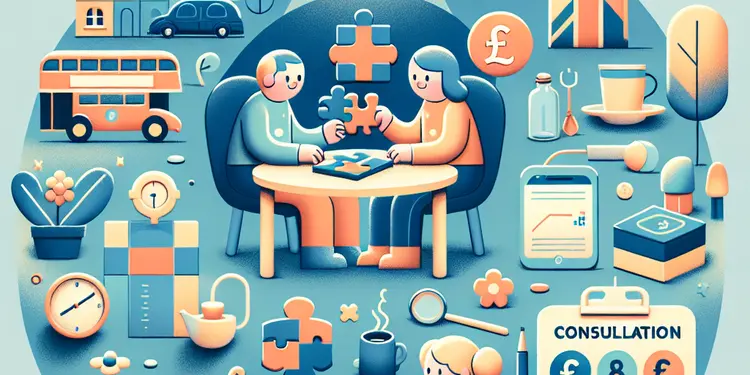
Find Help
More Items From Ergsy search
-

What advice is available for parents concerned about autism risks?
Relevance: 100%
-

Are vaccines linked to autism?
Relevance: 68%
-

Is there a genetic component to autism?
Relevance: 66%
-

What causes autism?
Relevance: 66%
-

Is there an autism test?
Relevance: 66%
-

What can cause autism, if not paracetamol?
Relevance: 66%
-

How is autism diagnosed?
Relevance: 64%
-

Is there any risk of using paracetamol outside of pregnancy with regard to autism?
Relevance: 63%
-

Autism - My Story - Adrian | NHS
Relevance: 62%
-

Is paracetamol linked to autism?
Relevance: 61%
-

What is the autism spectrum?
Relevance: 61%
-

What is Autism?
Relevance: 59%
-

How can early intervention help children with autism?
Relevance: 59%
-

Autism - My Story - Rosalind | NHS
Relevance: 57%
-

Autism Assessment - What Happens in Your Appointment
Relevance: 56%
-

Is there any scientific evidence that links paracetamol use to autism?
Relevance: 56%
-

How prevalent is autism?
Relevance: 56%
-

Is autism more common in boys or girls?
Relevance: 55%
-

Can autism be cured?
Relevance: 55%
-

How does autism affect communication?
Relevance: 55%
-

What are the signs of autism?
Relevance: 55%
-

What are some common therapies for autism?
Relevance: 54%
-

Can adults have autism?
Relevance: 54%
-

Autism: Graeme's story | NHS
Relevance: 53%
-

What kind of studies are conducted to investigate links between medications and autism?
Relevance: 52%
-

How can families support a member with autism?
Relevance: 51%
-

Why is there concern about paracetamol and autism?
Relevance: 51%
-

Can people with autism lead independent lives?
Relevance: 49%
-

What role do sensory issues play in autism?
Relevance: 49%
-

What is the difference between autism and Asperger's syndrome?
Relevance: 49%
-

The NHS Long Term Plan for learning disability and autism
Relevance: 46%
-

Navigating Legal Guardianship and Parental Responsibility in the UK
Relevance: 42%
-

Upcoming Changes to Parental Leave Policies in the UK
Relevance: 42%
-

Navigating the Changes to Parental Leave Regulations
Relevance: 42%
-

How are parents involved in the SEND process?
Relevance: 41%
-

What role do parents play in the social media ban?
Relevance: 41%
-

What online safety measures can parents implement?
Relevance: 41%
-

Transforming Care for people with Learning Disabilities and/ or Autism: Peter's Story
Relevance: 40%
-

Exercise Routines for Busy Parents
Relevance: 40%
-

Could parents override a social media ban for their under 16 children?
Relevance: 39%
Understanding Autism Risks
Parents in the UK often seek advice when they are concerned about potential autism risks in their children. Autism, or Autism Spectrum Disorder (ASD), is a developmental disorder that affects communication, behavior, and social interaction. Understanding the risks and early signs can be crucial for parents who want to ensure their child receives appropriate support and intervention.
Recognizing Early Signs
Early recognition of autism can lead to better outcomes for children. Parents should be vigilant for signs such as delayed speech development, lack of eye contact, difficulty in social interactions, and repetitive behaviors. It is important to note that these signs can vary greatly among children. If parents notice these signs, consulting a healthcare professional is advisable.
Consulting Healthcare Professionals
In the UK, parents concerned about autism risks can consult their GP or health visitor. These professionals can provide guidance and may refer the child to a specialist for further evaluation. Pediatricians, child psychologists, and speech and language therapists are some of the specialists who can assess and diagnose autism.
Accessing Local Support Services
Local support services play an essential role in addressing autism concerns. Parents can contact their local council to inquire about services for children with autism. Many councils provide information about local support groups, early intervention programs, and educational resources available to families. Additionally, the NHS offers various support and information services for children with autism and their families.
Utilizing Online Resources
Several reputable online resources are available for UK parents seeking information about autism. Organizations such as the National Autistic Society provide comprehensive information about autism risks, diagnosis, and support services. Their website includes guides, articles, and resources tailored for parents and caregivers.
Seeking Peer Support
Connecting with other parents who have children with autism can be immensely helpful. Peer support groups allow parents to share experiences, exchange advice, and provide emotional support. Many local communities have support groups, and there are also numerous online forums and social media groups dedicated to parents navigating autism concerns.
Understanding Genetic and Environmental Factors
While the exact causes of autism are not fully understood, research suggests a combination of genetic and environmental factors may increase the risk. Parents concerned about these risks may benefit from learning about potential factors and staying informed about recent research developments in this area.
Early Intervention and Education
Early intervention can significantly benefit children with autism, helping to improve communication skills and promote social development. Parents are encouraged to explore available programs and educational options in their area. Engaging with early intervention services as soon as possible can significantly impact a child's development positively.
Conclusion
Parents concerned about autism risks have access to a variety of resources and support systems within the UK. By recognizing early signs, consulting professionals, utilizing online and local resources, and engaging with peer support, parents can navigate these concerns effectively. Understanding the potential genetic and environmental factors and seeking early intervention can also help ensure the best possible outcomes for their children.
Understanding Autism Risks
Parents in the UK often worry about autism in their children. Autism is a condition that affects how a child talks, behaves, and makes friends. Knowing the risks and early signs helps parents get the right support for their child.
Recognizing Early Signs
Seeing the signs of autism early can help children do better. Parents should watch for things like late talking, not making eye contact, having trouble with making friends, and doing the same thing over and over. These can look different in every child. If parents see these signs, they should talk to a doctor.
Consulting Healthcare Professionals
In the UK, parents can talk to their family doctor or health visitor if they are worried about autism. These doctors can give advice and might send the child to a specialist. Specialists like children’s doctors, psychologists, and speech therapists can test for autism.
Accessing Local Support Services
Local services can help with autism concerns. Parents can ask their local council about services for children with autism. Many councils have information about groups, programs, and resources to help families. The NHS also has support services for children with autism and their families.
Utilizing Online Resources
There are many good websites for parents in the UK looking for autism information. The National Autistic Society has lots of information on their website about autism, tests, and support. They have guides and resources for parents and caregivers.
Seeking Peer Support
Talking to other parents of children with autism can be very helpful. Peer support groups let parents share stories, give advice, and support each other. Many places have local groups, and there are also online forums and social media groups where parents can connect.
Understanding Genetic and Environmental Factors
No one knows exactly what causes autism, but it might be due to both genes and the environment. Parents can learn about these factors and keep up with new research to understand more about the risks.
Early Intervention and Education
Early help is good for children with autism. It can help them talk better and make friends. Parents should look for programs and schools that can help their child. The sooner they start, the better it can be for the child.
Conclusion
Parents in the UK have many resources and support systems if they are worried about autism. By knowing the early signs, talking to doctors, using online and local resources, and joining support groups, parents can help their child. Learning about causes and getting early help can also make a big difference.
Frequently Asked Questions
What are common signs of autism parents should look out for?
Common signs include delayed speech, lack of eye contact, repetitive behaviors, and challenges with social interactions.
At what age can autism typically be diagnosed?
Autism can often be diagnosed by age 2, but some signs may be noticeable as early as 18 months.
What should I do if I suspect my child has autism?
If you suspect autism, consult with a pediatrician or a developmental specialist for an official evaluation.
Does vaccination increase the risk of autism?
No, extensive research has shown that vaccinations do not increase the risk of autism.
What resources are available for parents of children with autism?
Parents can access resources such as special education programs, therapy services, and support groups.
How can early intervention benefit a child with autism?
Early intervention can greatly improve a child’s development and ability to learn new skills.
What therapies are available for children with autism?
Therapies such as speech therapy, occupational therapy, and Applied Behavior Analysis (ABA) are commonly recommended.
Can diet changes help manage autism symptoms?
Some parents report improvements with certain diet changes, but scientific evidence is limited.
Are there any support groups for families with autism?
Yes, many communities have local support groups and there are national organizations that offer resources.
What role does genetics play in autism?
Research indicates that genetics play a significant role in autism risk, contributing to its complexity.
How important is routine for a child with autism?
Routine can be extremely important, providing structure and reducing anxiety for children with autism.
What kind of educational programs benefit children with autism?
Programs tailored to individual needs, often with a focus on communication and social skills, can be beneficial.
Is autism more common in boys than girls?
Yes, autism is about four times more common in boys than in girls.
What misconceptions about autism should parents be aware of?
Misconceptions include that all individuals with autism have intellectual disabilities or that autism is caused by poor parenting.
How can I communicate effectively with my child who has autism?
Effective communication may involve visual tools, sensory-friendly environments, and patience.
What is the prognosis for children diagnosed with autism?
Prognosis varies widely due to the spectrum nature of autism, but early and ongoing interventions can lead to improved outcomes.
Can technology aid in learning for children with autism?
Yes, technology such as apps and educational software can be tailored to support learning for children with autism.
Is it common for children with autism to have sensory sensitivities?
Yes, many children with autism experience sensitivity to sensory inputs like sounds, lights, or textures.
How can I support my child with autism in social interactions?
Structured playdates, social skills training, and role-playing can help children develop social skills.
Are siblings of children with autism at increased risk?
Yes, siblings do have an increased risk of autism compared to the general population, although the risk remains relatively low.
What signs of autism should parents look for?
Lots of people show signs like talking later than usual, not looking people in the eye, doing the same thing over and over, and finding it hard to talk and play with others.
How old is someone when doctors can say they have autism?
Doctors can tell if someone has autism when they are 2 or 3 years old. But some people might find out when they are older. If you or someone you know is learning about autism, it can help to talk to a doctor or a teacher.
Doctors can often tell if someone has autism by the time they are 2 years old. Sometimes, there are signs as early as 18 months old.
What if I think my child has autism?
If you think your child might have autism, here are some steps you can take:
1. Talk to a Doctor: Ask your child's doctor for help. They know a lot about children's health.
2. Watch and Write: Look at how your child acts. Write down anything you notice that seems different or special.
3. Speak to Teachers: Talk to your child's teachers. Ask them if they have seen anything special too.
4. Ask for a Test: You can ask for your child to have a special test. This test can help show if your child has autism.
5. Get Support: Look for support groups or talk to other parents. They can help you and your child.
Helpful Tools: Use pictures and simple words when talking with your child. It can make it easier for them to understand.
If you think someone might have autism, talk to a doctor who helps children or an expert in child development. They can check to see if autism is present.
Do vaccines cause autism?
Some people wonder if getting vaccines can lead to autism. Scientists have studied this a lot. They found that vaccines do not cause autism.
It is important to trust science and listen to doctors. If you have questions, talk to your doctor or a nurse.
You can look at pictures, watch videos, or ask someone to help explain things if you need more help understanding.
No, lots of studies have shown that vaccines do not cause autism.
What help can parents get for children with autism?
If you are a parent of a child with autism, there are things and ways to help you. Here are some ideas:
- Join a group of other parents who have a child with autism. You can talk and share tips.
- Look for books for parents. They have good ideas on how to help your child.
- Talk to an autism expert. They can give you advice and support.
- Check for classes and programs for children with autism. These can help your child learn and have fun.
Remember, you are not alone. There are many people and places ready to help you and your child.
Using pictures and simple words can make it easier for your child to understand. You can also use a timer for activities to help your child know when it is time to stop or start something.
Parents can find help like special learning classes, therapy sessions, and support groups.
How can early help be good for a child with autism?
Getting help early can be very good for kids with autism. This help can make them feel better and learn more. Starting early can make a big difference in how a child with autism grows and learns.
Here are some ways early help can be good:
- Children can learn to talk and share how they feel.
- They can learn to play with others and make friends.
- Kids can learn to do things by themselves, like eating and dressing.
- They can build confidence and feel good about themselves.
Supportive tools that can help include:
- Special activities and games that teach in fun ways.
- Time with teachers or helpers who know how to support kids with autism.
- Stories and books made just for kids with autism.
Helping kids early on makes a big difference. It helps them learn and grow better.
What help can children with autism get?
Here is some help for children with autism. Families and helpers can try these:
- Speech Therapy: Helps kids talk and listen.
- Occupational Therapy: Helps with daily tasks like dressing and holding a pencil.
- Behavior Therapy: Helps with good behavior and learning new skills.
- Social Skills Training: Helps kids play and talk with friends.
Using apps or picture cards can help children understand better. Teachers and families can work together to support the child.
Therapies like speech therapy, occupational therapy, and Applied Behavior Analysis (ABA) are often suggested.
If you need more help, you can try these:
- Speech Therapy: Helps you talk better.
- Occupational Therapy: Helps you do daily things more easily.
- Applied Behavior Analysis (ABA): Helps you learn new things step-by-step.
These can make learning and speaking easier.
Can changing what you eat help with autism?
Some parents say that changing what their child eats can help. But scientists don't have a lot of proof that this works.
Is there help for families with autism?
Yes, there are groups that help families with autism. These groups can give support and advice.
Here are some things you can do:
- Join a local autism support group. They can help you meet other families.
- Look online for autism forums and chats.
- Talk to a teacher or doctor for more ideas.
Yes, there are groups near you where people help each other. There are also big groups in the country that give help.
How do genes affect autism?
Research shows that genes are important in understanding autism. They make it more complex.
Why is a routine important for a child with autism?
Routine is very important for children with autism.
A routine is like a plan for the day.
When things happen at the same time each day, it can help children feel safe and calm.
Try using a visual schedule. This is a chart with pictures showing what will happen next.
It can help make things easier to understand.
Having a daily routine is really important. It helps make life more organized and makes kids with autism feel calmer.
What programs help kids with autism learn?
Programs that help kids with autism are important. These programs should be easy to understand and fun. They often include:
- Visual Aids: Using pictures and videos to make learning easier.
- Clear Schedules: Having a plan for the day so kids know what to expect.
- One-On-One Support: A teacher or helper gives special attention to each child.
- Games and Play: Using fun activities to teach new skills.
- Technology Tools: Learning with computers or tablets.
These programs help kids with autism enjoy learning and do their best.
Programs that are made special for each person can help. These programs often help with talking and making friends.
Do more boys have autism than girls?
Yes, more boys have autism than girls. Autism is something that can make talking and playing with others hard.
If you want to know more, using pictures or videos can help. Talking to a teacher or using apps for learning more about autism can also be helpful.
Yes, autism happens more in boys than in girls. Boys have autism about four times more than girls.
What should parents know about autism that is not true?
There are some wrong ideas about autism. Some people think everyone with autism has trouble learning. This is not true. Some people also think that autism happens because parents do a bad job. This is also not true.
How can I talk with my child who has autism?
Here are some tips to talk with your child:
- Be clear: Use simple words.
- Use pictures: Show pictures to explain things.
- Be patient: Give your child extra time to answer.
- Play games: Use fun games to help with talking.
- Use apps: Try apps that help with speaking.
Good talking and listening might use pictures, calm places, and waiting your turn.
What happens when children find out they have autism?
Autism can be different for each person. Some people might need more help than others. But, getting help early and continuing to get support can make things better.
Can technology help children with autism learn?
Using technology can be a good way to help children with autism learn new things. It can make learning fun and easier. Here are some ways it can help:
- Apps and Games: There are special apps and games that can teach children with autism. They can learn letters, numbers, and other skills.
- Videos: Watching videos can help children understand and remember things better.
- Tablets and Computers: Using tablets and computers can make learning more interesting.
- Speech Tools: Some tools can help children speak and communicate better.
Parents and teachers can use these tools to support children's learning. It is important to choose the right tools that fit each child's needs.
Yes, technology like apps and learning programs can help kids with autism learn better.
Do kids with autism often have strong senses?
Some kids with autism can feel things very strongly. This is called having strong senses.
They might find lights too bright or sounds too loud.
Wearing soft clothes or using headphones can help.
If your child feels things strongly, talk to a doctor or teacher to get help.
Yes, lots of children with autism can be sensitive to things they hear, see, or feel.
How can I help my child with autism make friends?
Children with autism may find it hard to make friends. Here are some ways to help:
- Talk about feelings: Help your child learn how to say if they are happy, sad, or mad.
- Practice taking turns: Play games that involve sharing and waiting for a turn.
- Use pictures: Show pictures to help explain what to do in different social situations.
- Role-play: Act out different ways to start a conversation with someone.
- Join groups: Find clubs or activities your child likes. Meeting others with similar interests can help.
You can also use tools like social stories, which are simple stories that show how to act in different situations.
Playing with friends, practicing social skills, and pretending to be different people can help children learn how to make friends and get along with others.
Do brothers and sisters of kids with autism have a higher chance of having autism too?
Yes, brothers and sisters have a higher chance of having autism than other people, but the chance is still not very high.
Useful Links
Have you found an error, or do you have a link or some information you would like to share? Please let us know using the form below.
-->
This website offers general information and is not a substitute for professional advice.
Always seek guidance from qualified professionals.
If you have any medical concerns or need urgent help, contact a healthcare professional or emergency services immediately.
Some of this content was generated with AI assistance. We’ve done our best to keep it accurate, helpful, and human-friendly.
- Ergsy carfully checks the information in the videos we provide here.
- Videos shown by Youtube after a video has completed, have NOT been reviewed by ERGSY.
- To view, click the arrow in centre of video.
- Most of the videos you find here will have subtitles and/or closed captions available.
- You may need to turn these on, and choose your preferred language.
- Go to the video you'd like to watch.
- If closed captions (CC) are available, settings will be visible on the bottom right of the video player.
- To turn on Captions, click settings .
- To turn off Captions, click settings again.
More Items From Ergsy search
-

What advice is available for parents concerned about autism risks?
Relevance: 100%
-

Are vaccines linked to autism?
Relevance: 68%
-

Is there a genetic component to autism?
Relevance: 66%
-

What causes autism?
Relevance: 66%
-

Is there an autism test?
Relevance: 66%
-

What can cause autism, if not paracetamol?
Relevance: 66%
-

How is autism diagnosed?
Relevance: 64%
-

Is there any risk of using paracetamol outside of pregnancy with regard to autism?
Relevance: 63%
-

Autism - My Story - Adrian | NHS
Relevance: 62%
-

Is paracetamol linked to autism?
Relevance: 61%
-

What is the autism spectrum?
Relevance: 61%
-

What is Autism?
Relevance: 59%
-

How can early intervention help children with autism?
Relevance: 59%
-

Autism - My Story - Rosalind | NHS
Relevance: 57%
-

Autism Assessment - What Happens in Your Appointment
Relevance: 56%
-

Is there any scientific evidence that links paracetamol use to autism?
Relevance: 56%
-

How prevalent is autism?
Relevance: 56%
-

Is autism more common in boys or girls?
Relevance: 55%
-

Can autism be cured?
Relevance: 55%
-

How does autism affect communication?
Relevance: 55%
-

What are the signs of autism?
Relevance: 55%
-

What are some common therapies for autism?
Relevance: 54%
-

Can adults have autism?
Relevance: 54%
-

Autism: Graeme's story | NHS
Relevance: 53%
-

What kind of studies are conducted to investigate links between medications and autism?
Relevance: 52%
-

How can families support a member with autism?
Relevance: 51%
-

Why is there concern about paracetamol and autism?
Relevance: 51%
-

Can people with autism lead independent lives?
Relevance: 49%
-

What role do sensory issues play in autism?
Relevance: 49%
-

What is the difference between autism and Asperger's syndrome?
Relevance: 49%
-

The NHS Long Term Plan for learning disability and autism
Relevance: 46%
-

Navigating Legal Guardianship and Parental Responsibility in the UK
Relevance: 42%
-

Upcoming Changes to Parental Leave Policies in the UK
Relevance: 42%
-

Navigating the Changes to Parental Leave Regulations
Relevance: 42%
-

How are parents involved in the SEND process?
Relevance: 41%
-

What role do parents play in the social media ban?
Relevance: 41%
-

What online safety measures can parents implement?
Relevance: 41%
-

Transforming Care for people with Learning Disabilities and/ or Autism: Peter's Story
Relevance: 40%
-

Exercise Routines for Busy Parents
Relevance: 40%
-

Could parents override a social media ban for their under 16 children?
Relevance: 39%


